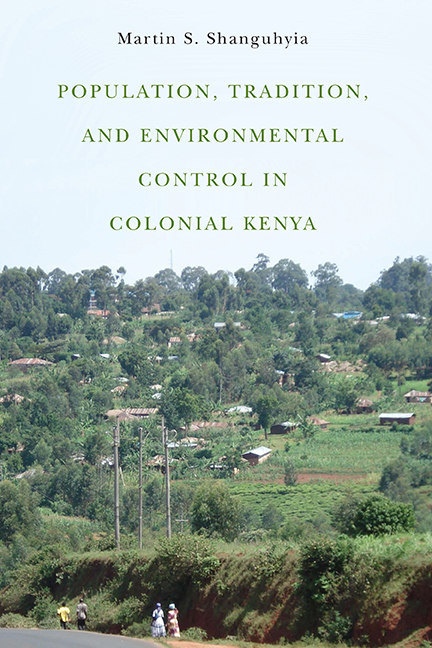Book contents
- Frontmatter
- Contents
- List of Illustrations
- Preface
- Abbreviations
- Introduction
- 1 Administrative and Demographic Changes: Implications on Land Relations, 1900–1930
- 2 Maize and Economic Prosperity, 1920–38
- 3 Internationalizing Degradation Narratives in Kenya, 1930–38
- 4 Prewar Soil Conservation Initiatives and Local Responses, 1934–38
- 5 Wartime Production in a Besieged Environment, 1939–45
- 6 Postwar Development and the Dilemma of “Reviving” African Traditions, 1945–63
- 7 Regional Migration and Failed Agricultural Intensification, 1940–66
- Conclusion
- Notes
- Bibliography
- Index
3 - Internationalizing Degradation Narratives in Kenya, 1930–38
Published online by Cambridge University Press: 09 June 2021
- Frontmatter
- Contents
- List of Illustrations
- Preface
- Abbreviations
- Introduction
- 1 Administrative and Demographic Changes: Implications on Land Relations, 1900–1930
- 2 Maize and Economic Prosperity, 1920–38
- 3 Internationalizing Degradation Narratives in Kenya, 1930–38
- 4 Prewar Soil Conservation Initiatives and Local Responses, 1934–38
- 5 Wartime Production in a Besieged Environment, 1939–45
- 6 Postwar Development and the Dilemma of “Reviving” African Traditions, 1945–63
- 7 Regional Migration and Failed Agricultural Intensification, 1940–66
- Conclusion
- Notes
- Bibliography
- Index
Summary
Introduction
Aside from the Great Depression, the 1930s were marked by regional and global concerns over land degradation. Soil erosion and the related problem of decline in soil fertility were at the core of these concerns. Internationalization of these issues underlined their importance to both governments and agricultural communities in many parts of the world, including colonial Africa. The American dust bowl provided the impetus for solving these environmental problems through the international exchange of agricultural and ecological information in the form of “agroecological internationalism.” Core agricultural areas in Kenya including Vihiga were integrated into global debates and international flow of environmental information about soil erosion, all focused on efforts to define the problem and come up with solutions to the perceived crisis. Local environmental concerns in specific rural domains of the British Empire were featured in the context of international debates about challenges posed by the ecological destabilization of agricultural and pastoralist environments of the world. Vihiga was one such area that became a destination in the flow of Western ecological solutions to land degradation to the extent that land degradation there ceased being strictly a local issue but became, rather, a regional and international issue. This chapter traces these local ecological concerns in Vihiga against an international and regional background with regard to land degradation in the 1930s.
Aside from analyzing the international and regional context of degradation narratives, the chapter also contends that soil erosion in Vihiga was a real problem, one induced by the physical relief of the area. Colonial officials ignored this fact and instead focused on human-generated causes such as intensive cultivation, population pressure, land scarcity, and insecure land tenure, among others. Of these, administration and agricultural officials concluded that intensive cultivation by farmers was the prime cause of the deteriorating state of the land in Vihiga. Intensive cultivation was in turn blamed on the official policy of urging farmers to produce surplus for sale and consumption, with the farmer caught in the middle as the villain. Farmers were content to subscribe to the policy of increasing surplus from the land, but they were not merely bowing to the whims of the colonial administration. They did so in order to reap the benefit of the market and as a strategy to overcome the economic pinch occasioned by the Great Depression.
- Type
- Chapter
- Information
- Publisher: Boydell & BrewerPrint publication year: 2015

